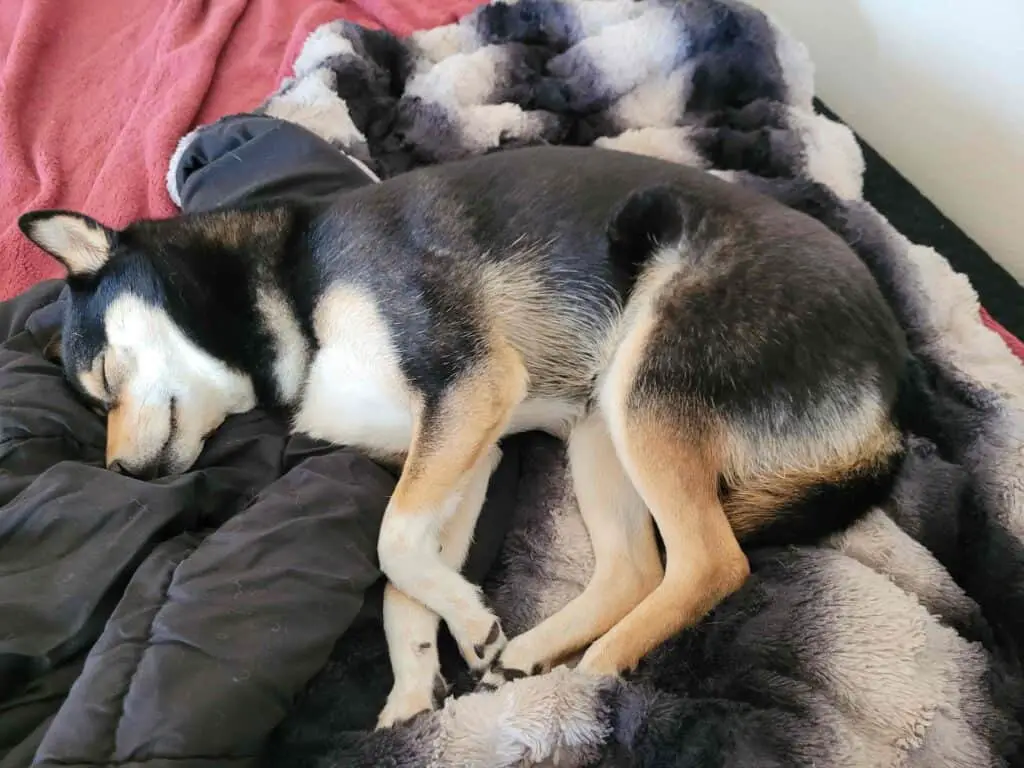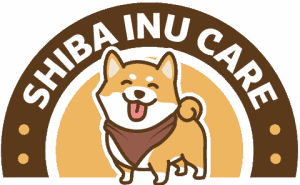This post contains affiliate links.
Understand and prevent bloat, a life-threatening condition that affects some dog breeds like the Shiba Inu. Bloat occurs when the stomach fills with gas or food and twists on itself, cutting off blood supply.
Certain breeds, including the Shiba Inu, are prone to bloat due to their body conformation. Stay informed about your Shiba Inu’s health risks and take proactive measures to ensure their health and well-being.

What Is Bloat?
Bloat, also known as gastric torsion or twisted stomach, is a life-threatening condition seen more often in deep-chested and large dog breeds. Symptoms include excessive drooling, swollen abdomen, rapid breathing, and signs of pain or discomfort.
What Causes Bloat In Dogs
- Eating habits: A dog that eats too quickly, consumes large amounts of food in a single sitting, or drinks a lot of water after eating a large meal may be at higher risk for bloat.
- Exercise: Exercising too soon after eating can also increase the risk. It’s essential to give your dog time to digest their food before engaging in vigorous play or exercise.
- Stress: High-stress situations, such as changes in routine or environment, can contribute to the development of bloat.
How Easily Can Dogs Get Bloat?
Bloat, also known as gastric torsion or twisted stomach, can happen quite quickly in some dogs. One moment, your dog could be happily playing, and the next, they may be suffering from a life-threatening condition. It’s crucial to keep an eye on your dog’s behavior and seek immediate medical attention if you suspect bloat.
What Dog Breeds Are At High Risk For Bloat?
Although any dog can develop bloat, certain breeds are more susceptible due to their physical traits and genetic predispositions. Some of these high-risk breeds include:
- Akita Inus
- Great Danes
- Saint Bernards
- Weimaraners
- Irish Setters
- Standard Poodles
It’s important to note that Shiba Inus are not in the high-risk category for bloat. However, this doesn’t mean that Shiba Inus are immune to the condition, so always be vigilant and proactive with your dog’s health.
Do Shiba Inus Commonly Suffer From Bloat?
Shiba Inus are a small to medium-sized breed, and bloat is more commonly found in larger breeds with deep chests, like Akitas or Great Danes. While it’s less likely for Shiba Inus to suffer from bloat, it’s still a possibility, so you should be aware of the symptoms and what to do if your dog shows any signs of distress.
Bloat occurs when the stomach fills with gas and/or food, causing it to expand and twist on itself. This cuts off blood supply and traps gas in the stomach, leading to shock and possible organ failure if not treated promptly. Signs of bloat in your Shiba Inu may include:
- A visibly enlarged stomach
- Retching without producing vomit
- Excessive drooling
- Restlessness or pacing
- Signs of discomfort, such as a hunched back
If you notice any of these symptoms, it’s crucial to act fast and get your Shiba Inu to a vet immediately. Time is critical, as bloat can escalate quickly and have deadly consequences.
You can take steps to reduce the risk of bloat in your Shiba Inu by following these practices:
- Avoid feeding your dog large meals or one large meal per day. Instead, break their daily food intake into two or three smaller meals.
- Avoid exercising your Shiba Inu immediately after a meal. Allow a few hours for digestion before engaging in activities.
- Limit access to water immediately after eating, but ensure they have access to water throughout the day.
- Monitor your dog if they seem to eat or drink too quickly, as this can increase the risk of bloat.
By following these guidelines and staying vigilant, you can minimize the risk of bloat in your Shiba Inu while keeping them happy and healthy!
Factors That Affect Bloat
Bloat, also known as Gastric Dilatation-Volvulus (GDV), can be quite concerning for your Shiba Inu. There are several factors that can increase the likelihood of bloat in your furry friend.
Age: As your Shiba Inu gets older, the chances of experiencing bloat may increase. This is because the muscles in their stomach weaken over time, making them more susceptible to GDV.
Behavior: Stressful situations or anxiety can negatively impact your Shiba’s digestive system. Ensuring a calm and consistent environment may help reduce the likelihood of bloat.
Active: Regular exercise is essential for overall health and well-being, but keeping a steady balance is crucial. Avoid intense or excessive exercise right before or after feeding times to minimize the risk of bloat.
Allergies: Food allergies or sensitivities can play a role in your Shiba’s susceptibility to bloat. By identifying potential food triggers and adjusting their diet accordingly, you can potentially reduce the odds of bloat occurring in your pet.
Exercise: As mentioned earlier, a good balance of exercise is vital. Avoid strenuous workouts, but make sure your Shiba Inu maintains an active lifestyle with daily walks or play sessions in the yard.
Remember to always consult your veterinarian if you have concerns about your Shiba Inu’s health. They can provide guidance on prevention, symptoms, and treatment options for bloat and other health issues.
Common Symptoms Of Bloat
One thing you need to be cautious about with your Shiba Inu is the risk of bloat. Bloat is a serious condition, but it can be identified early if you know the symptoms. Let’s dive into the common symptoms of bloat and how to recognize them.
What are the early symptoms of bloat in dogs?
The initial stage of bloat is known as gastric torsion or twisting of the stomach. You should pay attention to these early symptoms to get ahead of any potential complications. Your Shiba Inu might not seem happy during this time, which is a good indication that something is off. Here are some key signs to look out for:
- Restlessness: Your dog may seem uncomfortable and unable to settle.
- Pacing: They could be walking around more than usual, trying to alleviate the pain they’re experiencing.
- Excessive drooling: You might notice a significant increase in drooling, as they’re feeling the discomfort in their stomach.
As the condition progresses, you may notice more severe symptoms that show your dog is in considerable pain. These include:
- Swollen abdomen: If you see your Shiba Inu’s stomach significantly distended, it’s a clear sign of bloat.
- Difficulty breathing: The pressure in their stomach can make it harder for them to breathe.
- Inability to vomit: They might show signs of trying to vomit or retch, but without success.
In any of these cases, it’s crucial to act quickly and get your Shiba Inu the help they need right away. Remember, early detection can make all the difference in saving your dog’s life.
Preventing Bloat In Shiba Inus
As a Shiba Inu owner, it is important to take precautions to prevent bloat. Bloat, also known as Gastric Dilatation-Volvulus (GDV), is a serious health issue that can affect dogs, especially those with deep chests like Shiba Inus.
To prevent bloat, feed your Shiba Inu smaller meals throughout the day, avoid feeding your dog immediately after exercise or play, and keep your Shiba Inu hydrated by encouraging them to drink smaller amounts of water more frequently.
Monitor the ingredients in your dog’s food and opt for high-quality dog food that doesn’t contain ingredients such as corn, wheat, and soy. Regular exercise, mental stimulation, and monitoring your dog’s behavior are also essential in preventing bloat.
By following these tips, you’ll help create a safe and healthy environment for your Shiba Inu, and minimize the risk of bloat and other potential health issues. Remember, a happy and healthy pet is a well-cared-for pet!
How To Treat Your Shiba Inu For Bloat
If you suspect your Shiba Inu is experiencing bloat, it’s important to act quickly and stay calm. Contact your vet for guidance on treatment and try to keep your dog still and relaxed. Pay attention to their diet and exercise needs, and feed them smaller, more frequent meals from an elevated dish to reduce the risk of bloat.
Keeping a close eye on your Shiba Inu’s health can help manage potential risks. Be aware of common symptoms of bloat, such as:
- Distended or swollen abdomen
- Unproductive retching or vomiting
- Pacing or restlessness
- Excessive drooling
- Weakness or lethargy
Summary
If you’re curious about whether Shibas Inus are prone to bloat, you’ve come to the right place. In short, Shibas Inus are considered to be at a lower risk for bloat compared to other breeds, like Great Danes and Boxers. But, it’s still a good idea to be informed and aware.
So, what is bloat? Also known as Gastric Dilatation-Volvulus (GDV), bloat is a life-threatening condition where the stomach fills with gas and often twists on itself. This prevents blood flow to the stomach and nearby organs, requiring immediate veterinary attention.
When it comes to factors that increase bloat risk, Shibas Inus don’t check many of the boxes. They’re a small to medium-sized breed, and they’re not deep-chested like the high-risk breeds are. However, being aware of the warning signs is important for any dog owner. These include:
- A distended or swollen belly.
- Excessive drooling.
- Restlessness and pacing.
- Unproductive attempts to vomit.
- Rapid or heavy breathing.
Prevention is always better, right? Here are some tips you can follow to minimize the risk of bloat for your Shiba Inu:
- Feed smaller, more frequent meals throughout the day.
- Avoid rigorous exercise right after eating.
- Provide fresh water constantly, but don’t let your pup gulp large quantities at once.
- Encourage a relaxed eating environment by separating competitive pets during mealtime.
Remember, while Shibas Inus are at lower risk for bloat, it can still happen. Being vigilant about the signs and following preventive measures will help you keep your beloved companion safe and healthy.
Frequently Asked Questions
What Triggers Bloat In Dogs?
Several factors can trigger bloat, including overeating, gulping air while eating, drinking water excessively after eating, and exercising too soon after a meal. Additionally, stress and hereditary factors can also contribute.
How Easily Can Dogs Get Bloat?
Dogs can get bloat, but it’s not that common for all breeds. Bloat, also known as gastric torsion or twisted stomach, can be a life-threatening condition. Larger breeds with deep chests are more prone to this condition, whereas breeds like the Shiba Inu are not typically at high risk.
Do Shibas Have Sensitive Stomachs?
Shiba Inus can have sensitive stomachs, but this varies among individual dogs. If you notice that your Shiba Inu reacts negatively to certain foods or sometimes faces digestive issues, it may be worth consulting with a veterinarian to identify potential dietary triggers or solutions.
How Can I Prevent Bloat In My Shiba Inu?
To help prevent bloat in your Shiba Inu, try feeding smaller, more frequent meals instead of large amounts at a time. Avoid giving your dog food that can cause gassiness, and discourage your dog from eating quickly or gulping air during mealtime.
Refrain from letting your Shiba Inu drink excessive amounts of water after eating and avoid intense exercise right after they eat.
Which Dog Breeds Are Most At Risk For Bloat?
The breeds most at risk for bloat include Great Danes, Saint Bernards, Weimaraners, Irish Setters, and Boxers. Shiba Inus are not generally considered to be at high risk for bloat.

